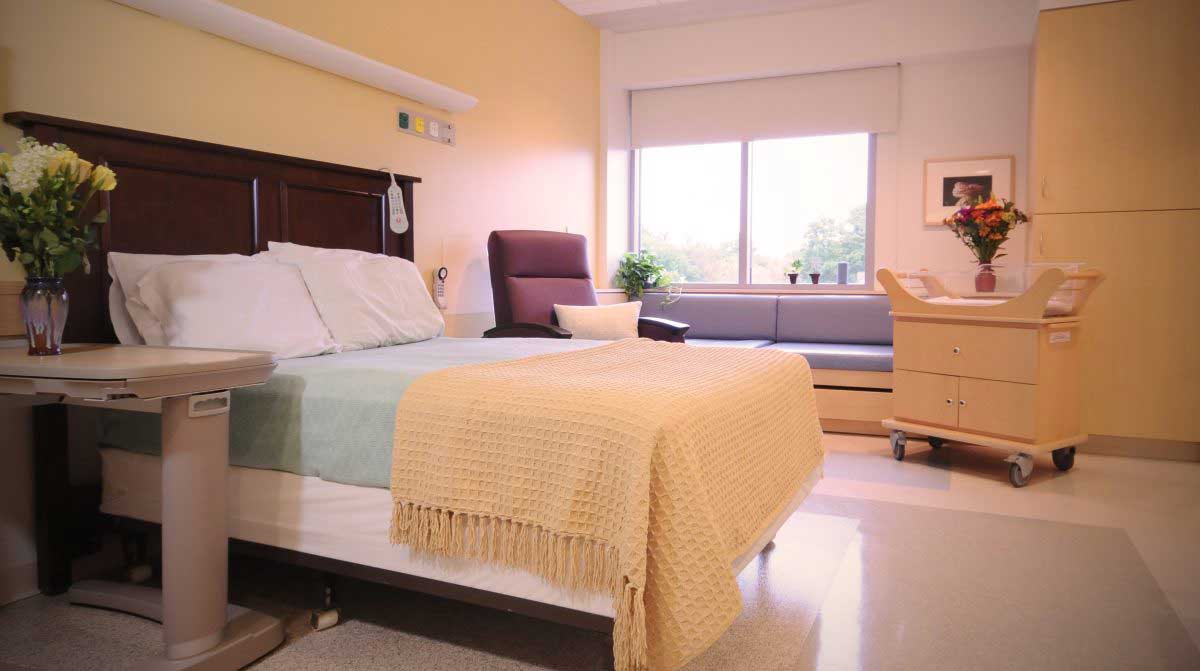Our hospital's current visitor information
Visits from friends and relatives can make a patient's hospital stay more enjoyable. Below is information about hospital visitation policies as well as hospital amenities and services.

Inpatient units and visitation
Effective August 29, 2022
Frisbie Memorial Hospital resumed its pre-COVID-19 visitor policy, which allows visitors to units between the hours of 8:00am and 8:00pm. Please read the following guidelines for further instruction before you visit:
- Emergency room patients are limited to one visitor at a time, per patient. The visitor must be 16 years old or older.
- Visitors for COVID-19 patients will be evaluated on a case-by-case basis.
- Overnight patients are limited to one visitor in the following cases:
- Laboring mothers
- Pediatric patients
- End of life
- Confused and/or anxious patients
- Designated support person for patients with a disability
- Exceptions may be made for extenuating circumstances after consultation with the administrator on call.
- Individuals with respiratory symptoms or other risk factors for COVID-19, such as exposure, will be asked to refrain from visiting.
- Effective April 3, 2023: Masks will no longer be universally required in this facility, and instead will be optional for patients, visitors, and staff. This change is due to a low community level of COVID-19. Please wear a mask if you have flu or COVID-19 symptoms, have tested positive for COVID-19, or have been exposed to someone with COVID-19. We will continue to make masks available at the public and employee entrances for those who choose to wear a mask while in our facility.
Hospital services and amenities
Our hospital is pleased to offer our visitors helpful services. Find more information about our amenities and how we can make your visit comfortable and convenient.
Meditation room
The meditation room provides a quiet space for visitors that wish to seek a place for thoughtful, meditative reflection. The meditation room is located across from the gift shop, adjacent to the lobby on the first floor.
Smoking policy
Our hospital maintains a smoke-free campus consistent with federal and state laws. Smoking, including the use of electronic cigarettes (e-cigarettes) and chewing tobacco by all employees, patients and visitors is prohibited in all areas of the hospital and its medical practices including grounds, parking lots and walkways.
We recognize the health and safety risks of smoking and our responsibility to provide leadership and guidance in health promotion and the provision of a safe and healthy environment for employees, patients, and visitors.
Vending machines
Vending machines can be found:
- Adjacent to the cafe
- On the hospital's main corridor on the first floor
- In the emergency room entryway
Wireless internet access and cellular phones
Wireless internet (Wi-Fi) is available to patients and visitors. Guest Wi-Fi allows patients and visitors to connect a laptop or other device with wireless capability for a designated period of time. Temporary access requires a username and password, which can be obtained by calling a hospital phone extension.
We recognize the value of cellular phones and other wireless devices as important communication tools. For patients, cell phones are allowed in patient rooms. Cell phone use for visitors is permitted in the main entrance lobby on the ground floor and patient waiting areas.
COVID-19 vaccination near you
Please visit vaccines.gov or call 1-800-232-0233 to learn when and where you can get a COVID-19 vaccine.
Facts and the latest updates about COVID-19 vaccination
See the Center for Disease Control's (CDC) resource page for extensive information and the latest recommendations regarding COVID-19 vaccination.
Why get vaccinated?
Immunization helps save millions of lives every year. Whereas most medicines treat or cure diseases, vaccines can help prevent them by working with your body's natural defenses to build protection. When you receive a vaccine, your immune system responds.
Vaccines prevent more than 20 life-threatening diseases, and help people of all ages live longer, healthier lives. The World Health Organization (WHO) estimates that globally, immunization currently prevents between 2 and 3 million deaths every year from diseases like diphtheria, tetanus, pertussis, influenza and measles.
COVID-19 vaccines work with your immune system so your body will be ready to fight the virus if you are exposed. Other steps, like covering your mouth and nose with a mask and staying at least six feet away from others, may help reduce your chance of being exposed to the virus or spreading it to others. Together, COVID-19 vaccination and following CDC's recommendations to protect yourself and others will offer the best protection from COVID-19.